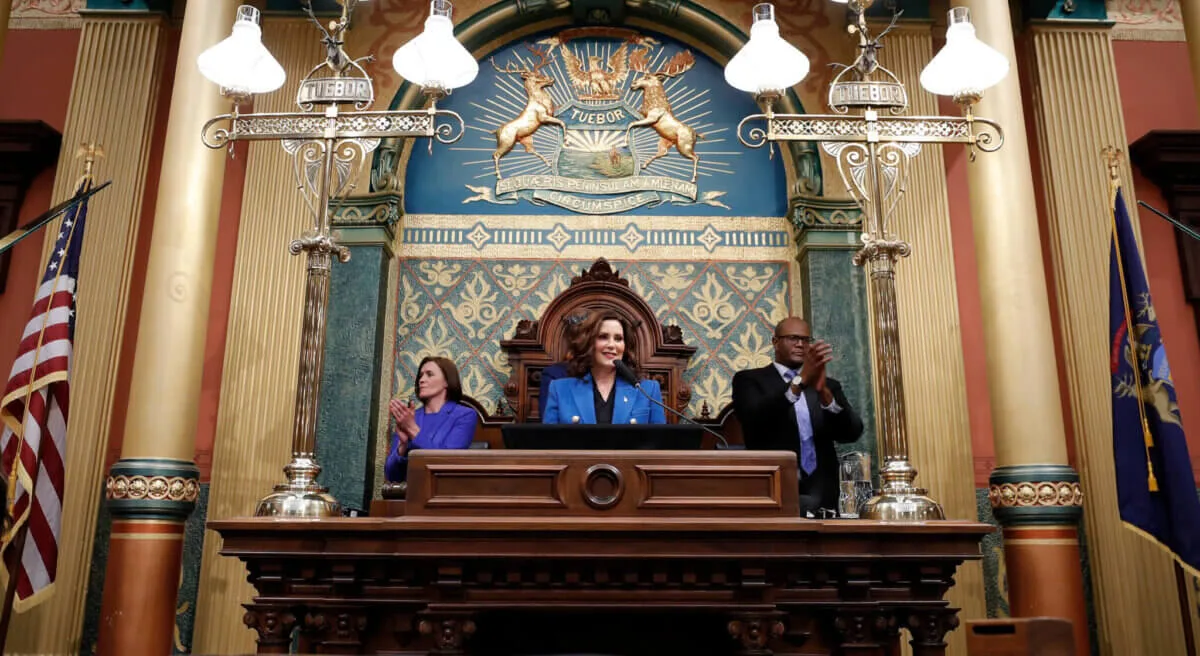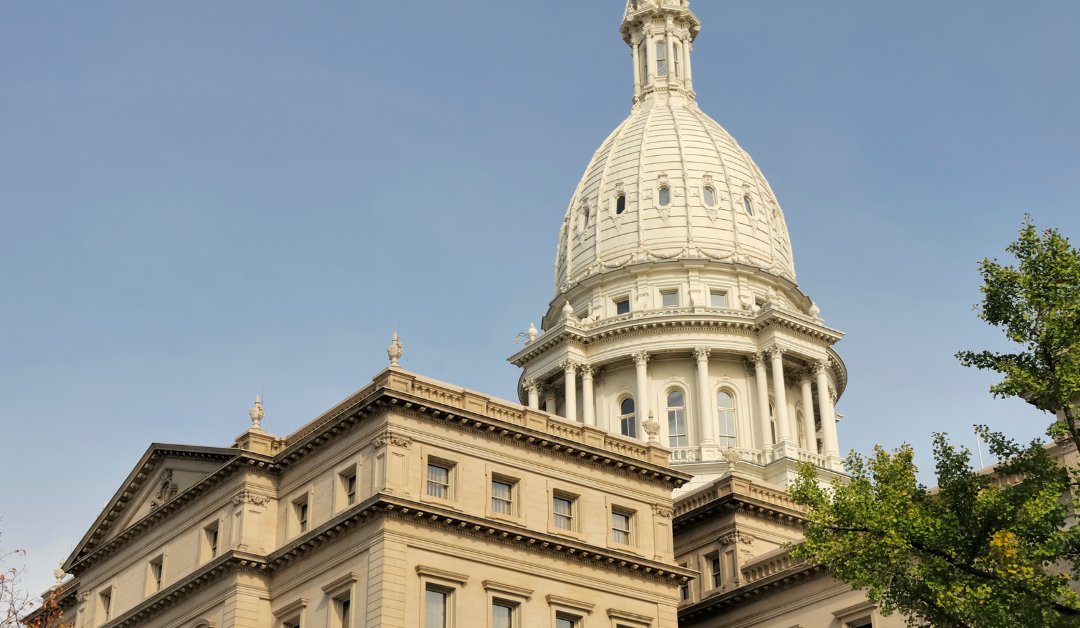
Gov. Gretchen Whitmer delivers her State of the State address to a joint session of the House and Senate on Jan. 25. (AP Photo/Al Goldis)
Gov. Gretchen Whitmer and Democrats in the state Legislature have been keeping busy since voters elected them in November.
MICHIGAN—Michigan House Speaker Pro Tempore Laurie Pohutsky (D-Livonia) looks back on the last 100 days since Democrats took control of the Michigan Legislature as a “whirlwind.”
“It’s been busy,” Pohutsky said on a recent episode of Party on the Peninsulas. “We really looked at the things that we’ve been promising to get done, in some cases, for decades. … These are things that have had bipartisan appeal for such a long time, things we’ve been introducing time and time again—just not getting any movement under a Republican majority.”
This week officially marks 100 days since Gov. Gretchen Whitmer began her second term and Democratic lawmakers gained full control of the state Legislature—a historic trifecta that hasn’t been seen in Michigan since the early 1980s. And over that 14-week span, a lot has changed.
Since Jan. 1, Whitmer has signed 13 bills into law, penned two executive orders, and ushered in what many Michiganders view as a new era for state government in which lawmakers act swiftly to pass legislation that answers directly to the people, and addresses their most pressing needs.
And over the last few months, Democratic lawmakers have moved expeditiously to tick through a lengthy list of long-sought policies from the Whitmer administration that, until this year, have been stymied by a state house filled with Republicans who largely stood in the way of progress.
“It just demonstrates how we knew under a Republican majority in the Legislature, these bills were never going to move,” Pohutsky said. “It’s a little frustrating because these are good, common-sense pieces of legislation and they’ve been stonewalled by the Republican majority.”
READ MORE: 4 Key Takeaways From the First 50 Days of Whitmer’s Second Term
Since Jan. 1: Thousands of new jobs have been announced as big-name companies rush to set up shop in Michigan, investing billions of dollars along the way. Republican-era taxes were slashed for more than 500,000 retirees, and 700,000 lower-income families got a big tax break.
And as quickly as new laws rolled out this year, just as many were dismantled.
Senate Majority Leader Winnie Brinks (D-Grand Rapids) declared it a “new day” in Lansing after lawmakers made Michigan the first state in decades to restore workers’ rights by repealing a union-restricting law known as “right-to-work” that was passed by Republicans in 2012.
Whitmer also signed legislation to shield the LGBTQ community against discrimination—namely by expanding long-sought civil rights protections to outlaw discrimination on the basis of sex and sexual orientation, as well as gender identity or expression. And just last week, Whitmer signed her name to legislation that repeals Michigan’s archaic abortion ban, after more than 57% of Michiganders voted in favor of keeping abortion access legal on Proposal 3 in November.
Lawmakers are also busy tackling gun safety reforms this year in the wake of another senseless mass shooting—this time at Michigan State University. Bills to create new safe storage requirements and universal background checks have already cleared the Legislature.
And for the first time in years, the state still has enough cash (about $9 billion) laying around the bank to trigger an automatic income tax reduction—dropping rates from 4.25% to a 15-year-low of 4.05%, which will save the average taxpayer about $50 when they file their taxes next year.
Political observers view Michigan’s progress standing out all the more on the national stage this year when compared to the legislative sessions from Republican-run states, where far-right conspiracy theories seem to fuel the majority of elected leaders’ focus.
The progressive politics have even earned Michigan a new nickname: The Anti-Florida.
Pohutsky added: “We are there to work, and sometimes that means doing a very serious job with deeply unserious people, so we have to stay focused and get through each day.”
Haven’t Kept Up With The Headlines?
Here’s a breakdown of what you may have missed in the last 100 days:
Economic Growth—and More Jobs
Since January, Whitmer has announced hundreds of millions of dollars in state economic development grants and other tax incentives that have helped entice several dozen big-name companies (like Ford and Home Depot) to plant roots or expand their operations in Michigan.
The governor now labels the last few years as the “best economic recovery in Michigan history,” with 220,000 new Michigan jobs created in 2021, and 92,000 more created since last February—including at least 35,000 new jobs in the automotive manufacturing industry.
The rapid growth this year was enough to make Michigan the top state in the nation for electric vehicle and battery investments and energy job growth, as well as the future home of what Newsweek has labeled as America’s “next Silicon Valley” for mobility innovations.
“Michigan is a place that will drive the world forward through grit, our world-class workforce, and our stunning natural resources,” Whitmer said in a statement. “We will work together to show the world what makes Michigan the best place to invest, innovate, live and explore.”
Among the biggest ticket items included in recently passed legislation was nearly $630 million in tax incentives to help cover infrastructure improvements in the city of Marshall—specifically to help prepare the area for a new electric battery manufacturing facility built by Ford Motor Co.
Once completed, the $3.5 billion manufacturing facility alone is expected to create 2,500 new manufacturing jobs, and help to secure Michigan’s dominance in the automotive industry.
Tax Relief for Michiganders
Two major tax reforms signed by Whitmer are poised to put $1.6 billion back into Michiganders’ pockets—and the legislation couldn’t have had a more appropriate name: “Lowering MI Costs.”
The primary goal, Whitmer said, was to help Michiganders pay bills and put food on the table.
“Michiganders need relief as inflation drives up costs and eats into their paychecks,” she said in a statement. “This is long overdue relief for Michiganders after the rug was ripped out from under them in 2011, when the retirement tax was slapped on and the tax credit was gutted.”
Rolling back the retirement tax is expected to save a half-million households an average of $1,000 a year. The tax—which was implemented under former Republican Gov. Rick Snyder’s administration—has been a top priority for Democrats for more than a decade.
Expanding the state-level Working Families Tax Credit to 30% of the federal Earned Income Tax Credit is also set to save about 700,000 Michiganders an average of $3,150 come tax season. Sen. Kristin McDonald Rivet (D-Bay City) led the charge to expand the tax credit this year, which ended up earning the backing of more than 230 community groups across the state.
Though initially included in Whitmer’s budget proposal, Democrats—who don’t have the legislative supermajority needed for bills to take immediate effect—were unable to garner the necessary support from Republicans to send $180 checks to all taxpaying Michiganders.
READ MORE: How Michigan Republicans Are Still Screwing You Out of Tax Relief
Instead, state officials are now using the $800 million that would’ve been spent on those relief checks to trigger an income tax reduction from 4.25% to 4.05%, saving taxpayers about $50.
After the vote, Brinks labeled the legislation the “biggest, broadest tax relief plan” in decades.
Workers’ Rights Restored
Michigan, long known as a mainstay of organized labor, last month became the first state in decades to restore workers’ rights after Democrats repealed a union-restricting law known as “right-to-work” that was passed over a decade ago by a Republican-controlled Legislature.
The state’s “right-to-work” law had allowed those in unionized workplaces to opt out of paying union dues and fees. And its repeal was celebrated across Michigan as a major victory for organized labor—especially after union membership had reached an all-time low last year.
“With Governor Whitmer’s signature repealing “right-to-work” and reinstating the prevailing wage law, Michigan strikes a serious blow to the anti-worker laws that have plagued our state,” said Branden Snyder, executive director of Detroit Action, in a statement. “This historic reversal is a testament to the power working people hold when we stand together to fight for justice.”
Repealing the “right-to-work” law, which was enacted by Republicans in 2012, has long been listed as a top priority for Democrats, who say the law only allowed “free riders” to receive union representation without having to pay fees or dues. Without the law, unions can now require all workers in a unionized workplace to pay fees for the cost of representation in bargaining.
Civil Rights Protections
Last month, Whitmer signed a bill to expand the state’s civil rights law to prohibit discrimination based on sexual orientation, gender identity or expression—marking a formal end to a decades-long battle to cement civil rights protections in Michigan for the LGBTQ community.
“This has been a long journey of real people here who have suffered and people who have died waiting for this moment to come,” said state Sen. Jeremy Moss (D-Southfield), the bill’s sponsor.
Michigan’s civil rights act already prohibited discrimination in employment, housing and public services based on religion, race, color, national origin, age, sex, height, weight, familial status or marital status. The new amendments were designed to curb discrimination for the nearly two-thirds of LGBTQ individuals who report experiencing discrimination in their everyday lives.
A wide array of businesses and economic organizations also advocated for the legislation this year as a way to make Michigan a more welcoming, inclusive and competitive state.
“Michigan’s laws should be as welcoming as our state feels,” Brinks said in a statement after the vote. “When policies allow for discrimination against a wide segment of our population solely based on who they love or their gender identity, we aren’t accomplishing that goal.”
Reproductive Freedom
An unenforceable abortion ban from 1931 was erased from state law after Whitmer signed legislation to repeal the archaic statute last week—effectively cementing reproductive freedoms for Michiganders that voters supported when they passed Proposal 3 last year.
“Michiganders sent a clear message: we deserve to make our own decisions about our bodies,” Whitmer said. “Standing up for people’s fundamental freedoms is the right thing to do.”
The package of bills formally repealed the nearly 100-year-old statute that criminalized abortion in Michigan. It also aligned state law with the newly amended State Constitution under Proposal 3—a citizen-led initiative for reproductive rights that passed with 57% of the vote last year.
Both chambers of the state Legislature passed the bills last month, with almost no Republican lawmakers voting to support the repeal despite the clear voter directive outlined in Proposal 3.
“It’s also just good economics,” Whitmer added.
Michigan is now the 10th state to protect reproductive freedoms and ensure its residents have access to safe, legal abortion in the wake of Dobbs v. Jackson. It’s a concept that has proven popular among Michiganders; Polling shows that 77% of residents believe abortion should be a woman’s decision to make with a medical professional, and not dictated by the government.
“Michigan continues to lead the way in the fight to restore our fundamental right to access abortion,” said Nicole Stallworth, executive director of Planned Parenthood Advocates of Michigan, in a statement. “Abortion providers will no longer have to fear they will be criminally prosecuted for delivering the essential, life-saving health care their patients need and deserve.”
Gun Violence Prevention
In the wake of the deadly mass shooting at Michigan State University, Whitmer and Democratic lawmakers have also thrown their support behind several common-sense gun safety proposals—and Whitmer plans to sign them into law when they make it to her desk this year.
“After years of things just getting worse, we are finally taking action to begin the process of making our state safer. Making our kids, our families, all the people of Michigan safer today,” said state Sen. Rosemary Bayer (D-Keego Harbor).
Bills for new universal background checks and safe storage laws have already made their way through the state legislature. Additional legislation that would create extreme risk protection orders are on deck. And in the meantime, Whitmer’s latest budget proposal includes an extra $500 million for public safety programs—like violence intervention initiatives to help address the root cause of violence, and more dedicated resources to train and retain local first responders.
READ MORE: What’s the Deal with Gun Reforms in Michigan?
Recent polling from Progress Michigan shows that nearly 8 in 10 Michigan voters (77%) also support universal background checks, with at least 62% of voters also supporting new red flag laws and safe storage requirements. About 49% of voters said they believed the pending legislation will reduce gun violence, while only 36% said they don’t think it’ll make a difference.
“One or even 11 bills are not going to be the entire solution,” Brinks said. “While the opposition will use that as an excuse to do nothing, we are using that as fuel to start taking steps now.”
Whitmer’s renewed focus on curbing crime is also paying dividends for Michigan after authorities reported a new milestone last month in their efforts to get more illegal guns off the streets, and out of the hands of those who cannot legally possess them. So far, more than 300 illegal guns (and plenty of drugs and ammo) have been taken off the streets as part of Whitmer’s “Operation Safe Neighborhoods” plan to help curb rising rates of gun violence.
Support for Public Education
In January, Whitmer proposed a $79 billion budget that aims to substantially invest in schools.
If passed by the Democratic-controlled Legislature in the coming months, Whitmer said her plan would mark a “historic education investment” by depositing $19 billion into the state’s School Aid Fund—which would also include a 5% increase in per-pupil funding for public school districts.
The new investments would also include $300 million to fund a universal pre-K proposal that would provide free preschool, hire more teachers and fund transportation for the state’s 5,600 4-year-olds. The governor said she also wants to put aside $160 million to become the fourth state to provide free breakfast and lunch for all students, saving families about $850 a year.
Last month, Whitmer also signed a bill to repeal a controversial state law which for years has punished Michigan students who fall behind more than one grade level in reading and writing by forcing them to repeat the third grade. Public education advocates have said the law did more harm than good, and lawmakers have characterized the old law as “arbitrary and punitive.”
“Today, we are taking action to put power back into parents’ hands so they can work with their child’s teachers and make decisions that are best for their family,” Whitmer said in a statement.
Whitmer’s latest budget also includes $195 million for educators themselves—including another $25 million in scholarships for aspiring teachers and $50 million in student teacher stipends. It also includes cash to retain teachers (especially in rural areas) through mentorship programs.
Democratic lawmakers—like Brinks and Sen. Darrin Camilleri (D-Trenton)—are seeking input from students, parents and educators as the budget process continues to unfold in Lansing.
Still Fixin’ the Damn Roads
Whitmer’s administration, as promised, has been focused on “fixing the damn roads”—as well as the state’s bridges, pipes, housing and all other kinds of infrastructure—in her second term.
By the end of last year, state officials said they fixed, repaired, or replaced more than 16,000 lane miles of road and 1,200 bridges—supporting more than 89,000 jobs without raising taxes. And last month, Whitmer announced more infrastructure fixes—including replacing old lead service lines, and continuing the state’s transition away from fossil fuels toward clean energy.
A Voice of Reason
Beyond legislative expediency, the new Democratic leadership in Michigan has offered something that many Michiganders find more valuable: A voice of reason in Lansing.
The alternative: Michigan Republican Chairwoman Kristina Karamo—who still refuses to concede to Secretary of State Jocelyn Benson despite an overwhelming defeat in November—has instead focused her party’s platform on more bizarre conspiracy theories.
The latest scheme involves convincing Michiganders that gun safety legislation will somehow lead to a genocide comparable to the Holocaust. Spoiler alert: It most definitely will not do that.
Other hits from the conspiratorial playlist of Karamo, the self-declared “voice of the Michigan Republican Party” include, but are not limited to: comparing abortion to child sacrifice; falsely claiming that Donald Trump won the 2020 election, downplaying the Jan. 6 insurrection; condemning LGBTQ relationships; accusing women of being addicted to porn; and declaring that couples who live together before marriage somehow opens the door to pedophilia.
“There are days where the Republican caucus is doing their best to be as distracting as possible, and frankly, just throwing temper tantrums,” Pohutsky told Party on the Peninsulas. “But the goal is to just get through the day as efficiently and as smoothly as possible. We come there everyday with a job to do, and we’re there to work. We’re not there to behave childishly.”
Politics

It’s official: Your boss has to give you time off to recover from childbirth or get an abortion
Originally published by The 19th In what could be a groundbreaking shift in American workplaces, most employees across the country will now have...

Michigan Dems win special elections to regain full control of state government
LANSING—Democrats won back a majority in the Michigan House and restored their party's full control of state government Tuesday thanks to victories...

Trump says he’s pro-worker. His record says otherwise.
During his time on the campaign trail, Donald Trump has sought to refashion his record and image as being a pro-worker candidate—one that wants to...
Local News

That one time in Michigan: When we became the Wolverine State
How did Michigan become tied to an animal that's practically nonexistent there? Among the many nicknames that the state of Michigan has, arguably...

Readers’ Choice: Top 5 Bowling Spots in Michigan
From retro lanes — including one of the oldest running bowling alleys in the country — to modern entertainment centers, there's something for...






